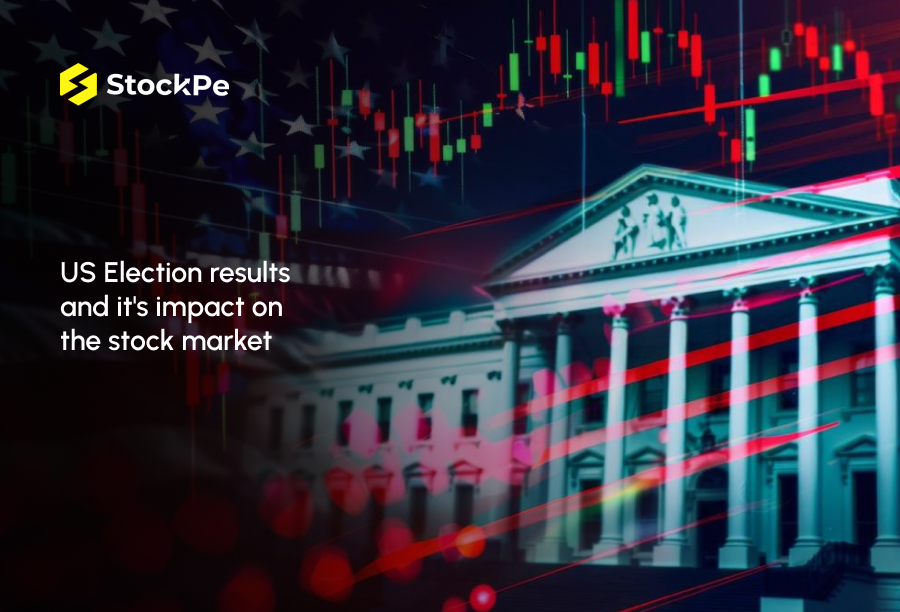The US presidential election in 2024 became a significant political event affecting the citizens as well as international investors. Especially for those who invest in emerging markets, such as India, the results of this election are of the greatest significance. India is the fifth largest economy in the world and a key player in the global market and thus remains vulnerable to any change in the US policy, economic performance as well as trade policies.
In this article, we will discuss how the US election outcomes may help shape the Indian stock market and the economy.
The 2024 US Presidential Election and Its Results
The U.S. presidential election occurred on November 5, 2024. Having gone through the electoral process it is now official, Donald Trump is the President-elect in the United States, to be inaugurated for his second term on January 20, 2025.
This win has massive consequences for the Indian stock exchange particularly when it is known that policy changes always occur during elections affecting global trade, defense, and investments. The global community is observing the situation closely, and India’s investors want to know how it will affect the stock market and the economy.
Key Areas of Impact: US Policies and India’s Economic Landscape
1. Trade Policies and Bilateral Relations
The bilateral relations between the United States and India have shifted considerably in the recent past, especially in trade, defense, and technology. Both nations have acknowledged the importance of the deepening of the bilateral economic relations, but the attitude toward these relations can differ depending on the type of political regime in the United States.
During President Trump’s second term, observers expect that the U.S. will maintain strategies of seeking to protect and give preference to U.S. companies when formulating trade policies. These policies could include raising tariffs or taking a protectionist approach in some sectors. For India, this may translate into more stringent conditions in some of the trade deals in areas such as technology, manufacturing, and agriculture which could impact exports to the US market.
However, the Trump administration is also expected to maintain its emphasis on the sectors where India has some edge over other countries and these are technology and defense. India’s IT segment, for example, could undergo further improvement in its commercial relationship with the U.S.
2. The US Dollar and Its Influence on the Indian Rupee
Another consequence of the US presidential elections can be seen in the value of the U.S. dollar in the global market. It carries value that can instantly affect the world economy including the Indian economy.
For example, in the future, if Trump’s policies cause a rise in the dollar in his second term, investors can move back to dollar assets like US treasury bonds, which will eventually lead to capital flights from emerging economies such as India. This change may lead to a decrease in the value of the Indian rupee making the imports costly and exert pressure on the rate of inflation. IT and pharmaceutical sectors which have been exporting products may benefit from a weaker rupee because their products will be cheaper to export.
3. Interest Rates, Inflation, and Global Liquidity
Monetary policy set by the Federal Reserve is yet another significant factor where the result of the U.S. election may lead to drastic results. The newly elected president of the United States exerts a measure of control over the Fed, especially on issues relating to interest rates and inflation. Higher interest rates due to the policies of this administration would raise borrowing costs and lower global liquidity.
For India, this implies that the cost of earning foreign capital—whether through FPIs or FDIs—may rise. Monetary policy measures like an increase in interest rates would reduce flows into emerging Risky markets and as such exert a negative influence on the Indian stock markets. This may also cause a low rate of economic growth in India as investment slows down.
4. Impact on Specific Sectors: Technology, Renewable Energy, and Defense
If Trump returned to the White House, the Indian tech, defense, and renewable energy sectors may have mixed results. IT outsourcing sector in India could face risks because of some anticipated changes in visa policies and a shift in the overall attitude to immigration. However, the sector could also gain with heightened demand for technology solutions from the United States market especially in IT security, cloud services, and outsourcing.
However, renewable energy and defense sectors will see the positive outcomes in case if the USA continues focusing on clean energy and strategic defense cooperation. For instance, India which targets a major expansion of renewable energy, in compliance with international climate change agreements, could benefit comprehensively from further cooperation with America in clean technologies.
The Historical Impact of US Elections on the Indian Stock Market
Reviewing prior U.S. presidential elections, it becomes apparent that the dynamics in Indian markets appear to adjust to changes in policies and global outlooks coming from the U.S. The Indian Markets are influenced by the U.S. election in a way that cannot be quantified at times but it cannot be denied that global liquidity, investor sentiments and trade relations affect the markets hugely.
Past US Elections and their Effects on the Indian Stock Market
- 2012 US Presidential Election: When Obama was in his second term, the Indian stock market was healthy, especially for the Nifty 50 index, which rose by about 27%. With support from global liquidity, and low interest rates in the United States, foreign institutional investments (FIIs) were attracted to new economies like India.
- 2016 US Presidential Election: Following Trump’s ascendancy to the presidency in 2016, Indian equity portfolio indicators fluctuated in the short term, with Nifty 50 dipping 7%. But as the year continued, and investors started to understand the changes that were being made by the new administration, the market recovered. Problems in the IT sector arose due to apprehensions about the availability of H-1B visas and strict rules on it impacted stocks such as Infosys and TCS heavily.
- 2020 US Presidential Election: With the Biden presidency, the market had a surge and, in the month of the election, the Nifty 50 went up by 8 percent. The investors understood Biden’s economic recovery plans and his approach to encouraging clean energy and other renewable technologies which are promising fields in India.
Will Trump’s 2024 Win Impact India’s Stock Market?
Given Trump’s victory, certain trends are likely to shape India’s stock market outlook:
- Global Trade and Investment: Under Trump’s administration, more focus has been directed to the reform of global trading, and the ‘America First’ policy may contribute towards a new round of tightening policies in sectors such as technology and manufacturing for India. However, there might still be an accumulation of cross-border investment in the defense and clean energy businesses.
- Dollar Strength and Currency Volatility: When the dollar rises, there can be high capital flight from emerging economies such as India. This could exert a decline in the Indian rupee and increase in inflation especially in organizations that import their inputs.
- Monetary Policy and Inflation: The Trump administration’s approach to economic policies may lead to an increase in interest rates in the globe, and in turn, poor global liquidity to funded Indian companies.
- Sectoral Impact: While IT and pharma industries which are net importers can look forward to a weaker rupee some industries that have a large exposure to the US will face challenges. Indian stock market will respond partially, some industries will do better while some industries will feel the heat.
Conclusion
When it comes to the short-term effect, especially after the 2024 US presidential election, there are potential short-term shocks in the Indian stock market. With India’s increased and strengthened connections with the United States touching new heights, investors should concentrate on the base – which is economic growth, corporate earnings, and long-term bilateral relationship, and not on political achievements.
Based on this conclusion, the current way of understanding how domestic and international factors interrelate remains the only critical strategy to master in emerging markets like India.





